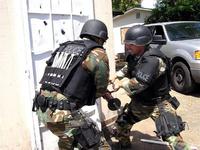-
African innovationFour African innovators selected for engineering innovation prize
Following an open, competitive, application process which saw entries from fifteen countries in sub-Saharan Africa, twelve African entrepreneurs were chosen to receive a package of six months of business training and mentoring from the U.K.’s Royal Academy of Engineering. The four finalists showing the greatest promise have now been chosen, and are in with a chance to become the overall winner. Each will receive at least £10,000 with the grand prize of £25,000 to be awarded at a ceremony in Cape Town on 1 June. A low-cost sustainable water filter system to provide clean and safe drinking water, and a service that allows African mobile phone users to switch easily between multiple mobile networks are among the four African innovations selected by the Academy.
-
-
ImmigrationDefying governor, Mass. officials seek to join Secure Communities

Local law enforcement officials and state lawmakers are increasingly working to circumvent Massachusetts governor Deval Patrick’s decision to opt out of the controversial Secure Communities immigration program; last Wednesday U.S Senator Scott Brown (R-Massachusetts) called on DHS secretary Janet Napolitano to allow the state to join Secure Communities without Governor Patrick’s approval; Under Secure Communities, a detained individual’s fingerprints are automatically scanned and checked against DHS and FBI databases to determine their immigration status
-
-
ImmigrationSan Jose halts gang violence, ends ICE partnership

Two months after it began its alliance with immigration officials to crack down on gang violence, the San Jose Police Department in California announced that it was ending its partnership with the U.S. Immigration and Customs Enforcement (ICE) agency; on 24 June, two ICE agents stepped in to help San Jose which was struggling to contain its highest murder rate in twenty years
-
-
Law enforcement technologyLondon police use smartphones, social network to identify rioters

The rioters in London — and now, in other British cities — have been using Blackberries to outmaneuver the police; communicating via BlackBerry instant-message technology, as well as by social networking sites like Facebook and Twitter, the rioters repeatedly signaled fresh target areas to those caught up in the mayhem; RIM has now agreed to cooperate with Scotland Yard to turn over protestors using the service to coordinate their assaults; the police is also releasing CCTV images of the rioters to a group using face recognition technology to identify and condemn rioters; the police is also using Flickr, Tublr, and Twitter to spot and identify participants in the riots
-
-
Law enforcementTampa police already training for 2012 RNC convention
In preparation for next year’s Republican National Convention in Tampa Bay Florida, nearly every local police department employee is required to attend a three-day training course; the mandatory training is designed to teach officers how to control large crowds
-
-
Law-enforcement technologyComputational forensics determines the rarity of a finger print
Crime scene forensic analysis has long functioned on the premise that a person’s unique identity is hidden in the tiny loops and swirls of their fingerprints, but teasing that information out of the incomplete prints left at crime scenes is still an inexact science, at best; a University at Buffalo researcher has developed a way computationally to determine the rarity of a particular fingerprint and, thus, how likely it is to belong to a particular crime suspect
-
-
Mexico: descent into chaosDoJ IG: ATF not doing enough to curb U.S. gun flow to Mexico
Because Mexican law severely restricts gun ownership, drug traffickers had turned to the United States as a primary source of weapons; the massive smuggling of firearms from the U.S. to Mexico has caused the militarization of the Mexican drug war: with drug cartels often better armed than the local police, President Calderon, in December 2006, has enlisted the Mexican military to take on the armed-to-the-teeth cartels; the war has already claimed nearly 30,000 dead, and has rendered many cities and towns in Mexico ungovernable; a new Department of Justice reports faults the U.S. Bureau of Alcohol, Tobacco and Firearms for not sharing enough information with its Mexican counterparts and other U.S. agencies, undermining the effort to stem the flow of firearms into Mexico
-
-
Border securityICE activates Secure Communities in ten more west Texas counties
Secure Communities uses biometrics to prioritize immigration enforcement actions against convicted criminal aliens; with the addition of ten new Texas counties, all eighteen westernmost counties of Texas are currently using Secure Communities
-
-
U.S. tech salaries up slightly
IT workers in the United States will see their pay rise by 1.8 percent in 2010 – but this will not keep up with the expected 2.6 percent inflation for 2010; software developers can expect 2.1 percent increases, operations staff 2.0 percent, server and network staff and system administrators could see 1.9 percent growth, managers 1.7 percent, and executives just 1.3 percent
-
-
IA certifications improve hiring, promotion, salaries
It pays to get cybersecurity certification; security skills accounted for 17 percent of base pay in the fourth quarter of 2007, and pay for network security management skills increased by more than 27 percent in 2007; going forward, IT professionals will need to be able to incorporate their security savvy into network, wireless, application, operating system, and other IT areas to best compete
-
-
More evidence points to value of security certification
Certifications improve prospects for hiring and higher salaries; holders of the CISSP, SSCP or CAP certifications who work in the Americas and have at least five years experience earn [an average of] $102,376 per year — more than $21,000 higher than IT pros who also have five years experience but lack the certification
-
-
Cyber security certification is not a panacea for cybersecurity woes
The U.S. Congress is deliberating proposals to require cybersecurity certification for cyber security professionals; although a good certification standard might be a measure of a baseline level of competence, it is not an indicator of job performance; having certified employees does not mean firewalls will be configured securely, computers will have up-to-date patches, and employees won’t write passwords on the backs of keyboards
-
-
French company's bid for Digimarc raises U.S. security concern
L-1 Identity Solutions’ Robert LaPenta says allowing French company Safran, which is 30 percent owned by the French government, to acquire U.S. ID card maker Digimarc would compromise security of U.S. citizens’ personal information
-
- All
- Regional
- Water
- Biometrics
- Borders/Immig
- Business
- Cybersecurity
- Detection
- Disasters
- Government
- Infrastructure
- International
- Public health
- Public Safety
- Communication interoperabillity
- Emergency services
- Emergency medical services
- Fire
- First response
- IEDs
- Law Enforcement
- Law Enforcement Technology
- Military technology
- Nonlethal weapons
- Nuclear weapons
- Personal protection equipment
- Police
- Notification /alert systems
- Situational awareness
- Weapons systems
- Sci-Tech
- Sector Reports
- Surveillance
- Transportation
Advertising & Marketing: advertise@newswirepubs.com
Editorial: editor@newswirepubs.com
General: info@newswirepubs.com
2010-2011 © News Wire Publications, LLC News Wire Publications, LLC
220 Old Country Road | Suite 200 | Mineola | New York | 11501
Permissions and Policies
Editorial: editor@newswirepubs.com
General: info@newswirepubs.com
2010-2011 © News Wire Publications, LLC News Wire Publications, LLC
220 Old Country Road | Suite 200 | Mineola | New York | 11501
Permissions and Policies
